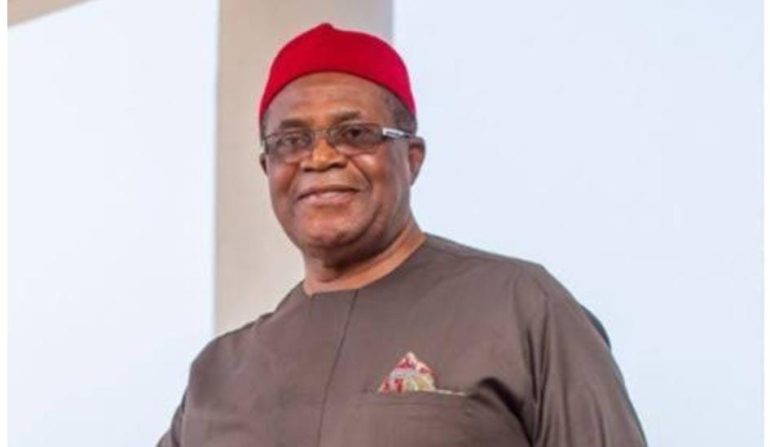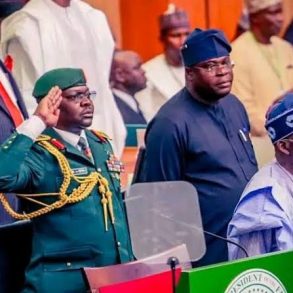By Adejumo David Adebayo
In what way did a group that arrived in Yorùbáland about 100 years ago (between 1911 and 1920) “create” Lagos, a commercial hub that dates back to approximately 1492?
Well, There is a common Pidgin slang phrase used in Nigeria: “Miracle no dey tire Jesus.”
Perhaps the “Igbo” bearing Yorùbá subgroup or towns being discussed are Ijebu-Igbo, Ìgbómìnà, Igbotako, and others?
To be honest, though, Lagos wasn’t built with proceeds from “Marijuana”, so perhaps that’s where the misunderstanding originated.
The subject of this article’s fact-checking endeavours to uphold the Yorùbá Adage: “Ẹni tó bá fẹ́ jẹ ogún kógún ní ń pa ìtàn kítàn, ” which translates literally to mean, “He/She who wishes to inherit property that are not his/hers will give non-evident claims and history to support his/her claims.”
In light of this, how do we respond to so-called “Elders” and “Statesmen” who openly invoke the Yorùbá Adage?
The most recent is Chief Okwesilieze Nwodo; some months earlier, the President of the Apex Igbo Sociocultural Organisation, Ohanaeze, Emmanuel Iwuanyanwu, also made unfounded claims about how his people, the Igbos, transformed the area from swampy, barren land into an urbanised zone, a residential area, and a place of great economic splendour compared to its peers.
One starts to question whether the youths should be held less responsible since this is clearly a generational story that is being passed down from one generation to the next if well-known “Igbo leaders,” even “religious leaders,” could be spreading this false narrative along with many others.
Nevertheless, attempts to reorient these elders and their grandchildren are consistently described as Igbophobia, Igbo repression, and disdain for Igbo people; these attitudes did not emerge in the twenty-first century.
Many people who have made efforts trying to reorient them are realising that it would be foolish to try and convince them that doing so would benefit their people more than being ethnocentric and protecting their ethnicity from potential danger.
It is possible to classify actions taken by National Orientation Agency and/or Rehabilitation Centres as “Igbo Repression.”
Since “We all hate Igbos,” it will be futile to try to persuade or reorient these elders and others with factual knowledge and evidence.This essay is directed for potential victims who might have been duped by the generational claims made repeatedly.
“IGBOS CREATED LAGOS”—is that statement accurate?
Here are some historical, economic, and statistical data on Lagos that will help us respond to this:In Memory of Fawaz Alabi, also known as the Legendary Alabi, our fallen comrade, hero, and brother, whose passion during his time with us was supporting Lagos, Awori, and Yorùbá. We are grateful for the brief time he had with us, as it was memorable, impactful, and resourceful.
We all owe death, and one day we will all answer to his calling.
He provided us with a wealth of information via his X Handle, posted archives, data, and information, and fought valiantly like a soldier, a lover of knowledge in many spheres, and a potential political leader.
Sadly, we lost him in an unfortunate situation.
If Fawaz Alabi had been alive, he would have loved this article because it addresses many of the causes he fought for, among many others.
It’s not surprising that the sons and daughters of perdition, whose ancestors and elders narratives, this article seeks to address, cyberattacked him while he was alive even after his death.
“We wish they’d never die too.”
Fawaz Alabi if alive would have loved this article as it addresses what he fought for amongst many others.
A Few Details About Lagos using the most up-to-date information and historical records available:
𝐄𝐕𝐎𝐋𝐔𝐓𝐈𝐎𝐍 𝐎𝐅 𝐋𝐀𝐆𝐎𝐒 [ È𝐊Ó ] 𝐅𝐫𝐨𝐦 𝟏𝟏𝟎𝟎 𝐀𝐃 – 𝟐𝟏𝐬𝐭 𝐂𝐞𝐧𝐭𝐮𝐫𝐲 1. 𝐊𝐢𝐧𝐠𝐝𝐨𝐦 𝐅𝐨𝐮𝐧𝐝𝐢𝐧𝐠 𝐄𝐫𝐚 𝐚𝐧𝐝 𝐍𝐚𝐭𝐢𝐯𝐞 𝐏𝐨𝐩𝐮𝐥𝐚𝐭𝐢𝐨𝐧
Around the year 1100 AD, A Town/Kingdom was founded by Ifè Prince whose name is known as Olofin Ogunfunminire Agbodere Awogunjoye, the town is Isheri- regarded as Homeland/Headquarters of All Awori.He or his Son, Atekoye moved to Iddo and Ebute metta and founded these places, where he had 32 Sons with his wives Ajaiye and Akesan. He divided the lands amongst his Sons, whose descendants are Idejo, they are the landowners of Lagos.Different Awori families have compounds as well.
2. 𝐄𝐮𝐫𝐨𝐩𝐞𝐚𝐧 𝐂𝐨𝐧𝐭𝐚𝐜𝐭 𝐚𝐧𝐝 𝐓𝐫𝐚𝐝𝐞 𝐄𝐫𝐚 𝟏𝟒𝟕𝟐𝐀𝐃- 𝟏𝟖𝟓𝟏𝐀𝐃
A Portuguese explorer, Ruy De Sequira explored the island area (Èkó) around the year 1472 Èkó that is 100 years before the Bini/Itsekiri/Ilaje immigrated to live on the island among the Yorùbá autochthones.” He described the Island as “Koráme”/“Curamo” messy spelling (of the island’s local name) corresponds to no else than Èkó Aromi-rẹ which is the islands local name. First and Earliest Description in History. – Portuguese Trading Hub shifted to Lagos island ( Èkó) which became a magnet 🧲 that attracted immigrant groups.
3. 𝐈𝐦𝐦𝐢𝐠𝐫𝐚𝐧𝐭 𝐄𝐫𝐚 𝐌𝐢𝐝 𝟏𝟓𝟎𝟎𝐀𝐃
The Portuguese trade hub shift to Lagos attracted immigrant groups, most prominent would later be Bini/Itsekiri/Ijaw/Ijebu/Ilaje, Owo. The island which was pepper farm established by Aromire and dependent/part on Iddo Kingdom under Oloto/Olofin would attain independence when Ashipa – Isheri Chief ( left Isheri for Iddo) obtained support by Benin Royal, sealing the alliance further by marrying Benin princess- Awuse, A son was birthed in Benin, whose name was Ado. This is the birth of Èkó Kingdom ( Previously part of Iddo Kingdom). Ado would later leave Benin for Èkó and became the first crowned King.
𝟒. 𝐄𝐱𝐨𝐝𝐮𝐬 𝐨𝐟 𝐅𝐫𝐞𝐞𝐝 𝐄𝐧𝐬𝐥𝐚𝐯𝐞𝐝 𝐘𝐨𝐫ù𝐛á 𝐭𝐨 𝐋𝐚𝐠𝐨𝐬 𝐄𝐫𝐚, 𝟏𝟗𝐭𝐡 𝐂𝐞𝐧𝐭𝐮𝐫𝐲
Returning Yorùbá Liberated Enslaved Individuals from Sierra Leone, Americas ( Brazil/Cuba) ( Saros & Aguda) brought with them to Lagos, Artisanal skills like wood work, bricklaying etc, many were Western Learned such that by 1860s, Many were graduates of law, medicine and pioneers in Africa and Nigeria. These Saros/Agudas are of mostly Egba origin but also Ijebu, Òyó, Èkìtì, Ifè, Ilorin, Egbado/Yewa, Ondo origins but settled in Lagos due to fear being recaptured and also felt protected under British protection in Lagos.
The da Silvas, the Paynes, the Grillos, the da Rochas and the Alakijas returned home from far away countries like Cuba and Brazil. Da Rochas was African richest at the time.
In contrast, there were also a sizable number of Nupe and Igbo, who made up the second-largest ethnic group in Sierra Leone.
The Pratts and Hortons (prominent Igbo) led no return-to- the-fatherland movement, J. A. B. Horton making only a defective mental excursion to Igboland. ” In no other part of Nigeria was there a British enclave like Lagos where the Saro could move near to their ethnic groups.Hence the failure of the reconnoitering visit to Old Calabar by some Igbo who dare not move into Igboland.It was to Old Calabar and Fernando Po that many of them returned, but only in a very tiny number.Igboland was entirely sealed to outsiders, including the Saro Igbo.
5. 𝐁𝐫𝐢𝐭𝐢𝐬𝐡 𝐂𝐨𝐥𝐨𝐧𝐢𝐚𝐥 𝐄𝐫𝐚 – 𝟏𝟖𝟔𝟏 𝐀𝐧𝐧𝐞𝐱𝐚𝐭𝐢𝐨𝐧 – 𝟏𝟗𝟔𝟎 (𝐍𝐢𝐠𝐞𝐫𝐢𝐚𝐧 𝐈𝐧𝐝𝐞𝐩𝐞𝐧𝐝𝐞𝐧𝐜𝐞)
Even though Nigeria gained its independence in 1960, the NNDP and later NYM’s efforts in Lagos had already begun to Africanize the city. The British did, of course, contribute to the development of Lagos, but not at their own expense, as the port of Lagos was utilised to export raw commodities that Britain required, and palm oil from the Hinterland was shipped for the industrial revolution. British earnings exceeded their contributions to Lagos, so the trade was not quite balanced.
6. The 1930s–1966 Period (NYM, Egbe Omo Odùduwà, A.G./Awolowo)
The Yorùbá People, who were not Saro/Aguda, embraced Western Education and eliminated the Saro/Aguda dominance over it between the age of the Nigeria Youth Movement and Egbe Omo Odùduwà in 1948.
99.7% of the current Lagos State Landmass was part of the Western Region prior to the creation of Lagos State in 1967. A.G under Awolowo Premiership built Ikeja and others. The Western Region enjoyed free primary education policy and industrialization of Lagos- Abeokuta – Ibadan axis. Lagos Stock Exchange was created, which would later become Nigerian Stock Exchange. The first shareholders were 7 people and they all had equal shares.
List included Sir Odutola and Doherty and Akintola Williams.Ojukwu Sr. did not establish stock exchange. He was the first president but not the founder.
It is true that several immigrant groups have contributed to the development of Lagos, but this is true worldwide, and these immigrant groups are not limited to Igbos; in fact, it wasn’t until 1931 that the Igbo population in Lagos overtook the Hausa population.
Note: Hausa Group has been in Lagos since 1865.
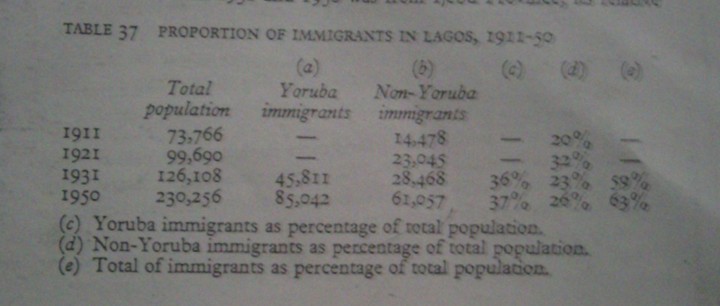
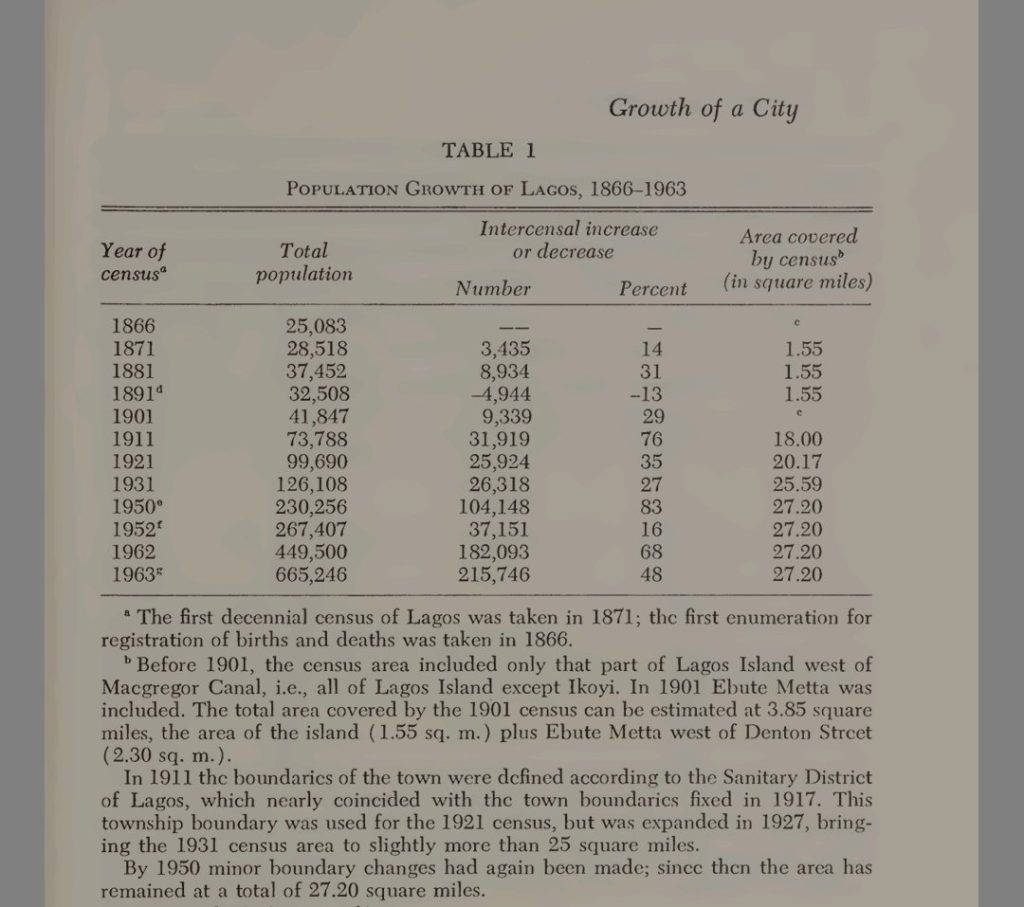
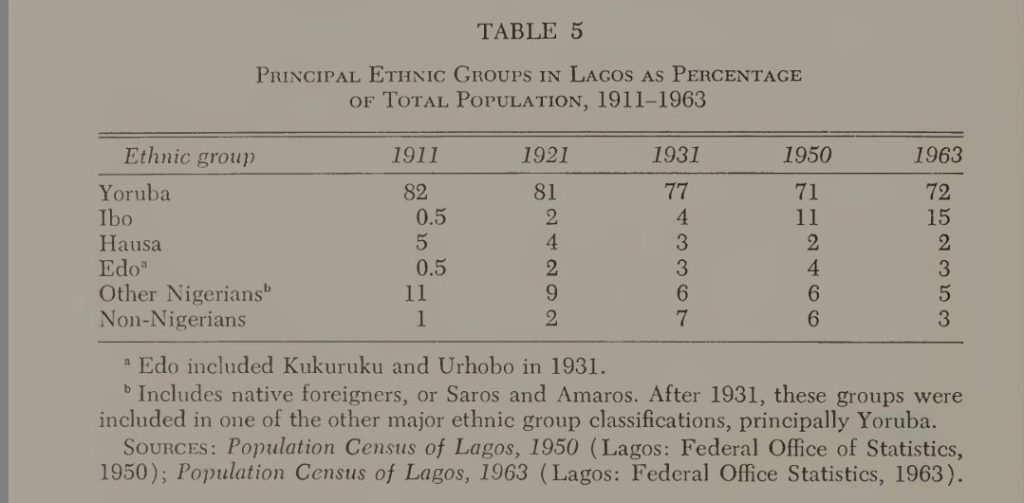
Furthermore, Yorùbá are not lone individuals; what have they contributed to Enugu? Kano, Port Harcourt? Should we start oversimplifying and weaponizing it? Every native territory has its own people who contribute most to its growth; Lagos is home to natives and is not a settler colony like the United States, Canada, or Australia ( even these have white majority nuances).
Before Biafra was officially declared, Ojukwu said that the Igbo people should go back home. Many, if not most, of them did, and after Biafra was proclaimed (the oil-rich South-South, with the exception of Delta, Edo, and a small portion of Bayelsa in the Midwest, were included in this BIAFRA), the oil now belonged to the newly declared Republic of Biafra. Nevertheless, Nigeria’s GDP increased significantly following the secession, and Awolowo served as finance minister.
Yorùbá did not confiscate Igbo-owned property after the civil war ended, nor were there any pogroms prior to it; instead, Yorùbáland emerged as the most liberal And welcome to Igbos.
Minorities in the COR region (minorities in the Eastern Region) who found themselves being slain and subjugated by Igbos would also be hostile, seizing Igbo property and labelling it abandoned property.
Of course, minorities in the “neutral Midwest” who found themselves invaded and murdered by Biafran Army would be unfriendly to Igbos. When the oil boom of the 1970s and 1980s occurred, more Igbos moved to Lagos. Favourable policies for the Alaba Market were “given,” not purchased, and so forth by Lateef Jakande. Igbo people are now represented in Lagos’ government, with numerous Igbo people appointed to state positions. Many, if not thousands, of Igbo people are employed in Lagos’ civil service. Lagos, in contrast to Abuja, is not a planned capital territory that was created from the ground up by the government; nor was it developed specifically with “oil proceeds,” meaning that it received a portion of the proceeds from the sale of oil, just like every other state in Nigeria.
Since 1991, Lagos has not served as the capital. Lagos Port was established before Nigeria even existed, and it is under the control of the Federal Government (NPA), not LASG or “Yorùbá.” Yorùbá has no authority over her port.
With assistance from the British administration, Lagos became the first city in Nigeria to have electricity in the late 19th century, followed by Abeokuta. In 1950, Awolowo opposed Lagos’s status as an FCT, but Zik overruled him with support of the British, Oliver Lyttleton.
𝗗𝗶𝘀𝗽𝗲𝗹𝗹𝗶𝗻𝗴 𝗠𝗮𝗶𝗻𝘀𝘁𝗿𝗲𝗮𝗺 𝗣𝗿𝗼𝗽𝗮𝗴𝗮𝗻𝗱𝗮: Considering everything that has already been said about Lagos’ evolution over the ages. Here are the Dangerous Narratives that have persisted since the 1950s.
“Get rid of Lagos!
“We Collectively Built Lagos!
“We developed Lagos after purchasing swamp and empty land!
“It was the former Capital built with ‘Our’ collective wealth and resources and doesn’t belong to Yorùbá!
All the above were emphasized by “Founding Fathers from East and North” at the Lagos Conference in 1953.
The Late Sage Asiwaju Obafemi Awolowo spoke about the Lagos Question:
” The second argument that Lagos is developed with Nigerian money is not only ill-informed, but obviously spring from jealousy and spite.
“The comparative dazzling beauty of Lagos with its enlightened, civilized and independent – minded inhabitants is bound to excite the jealousy of people who have nothing to show in their territory to match the pre-eminence of Lagos.
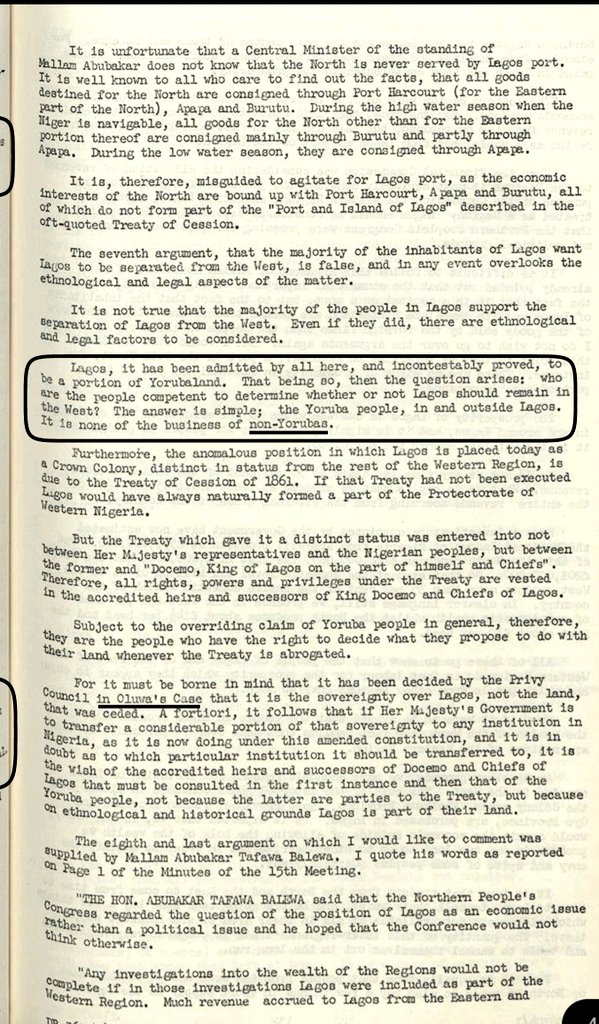
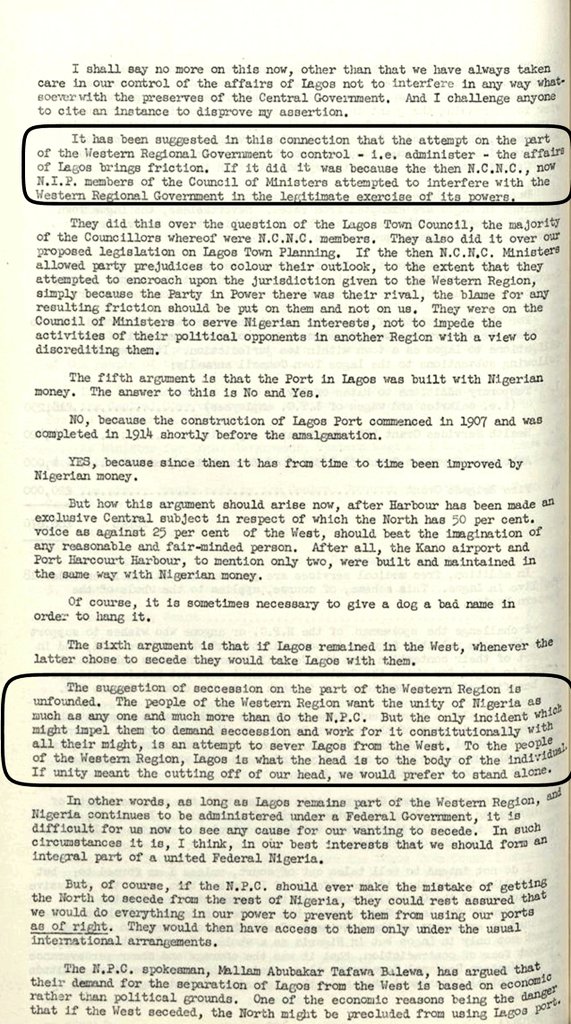
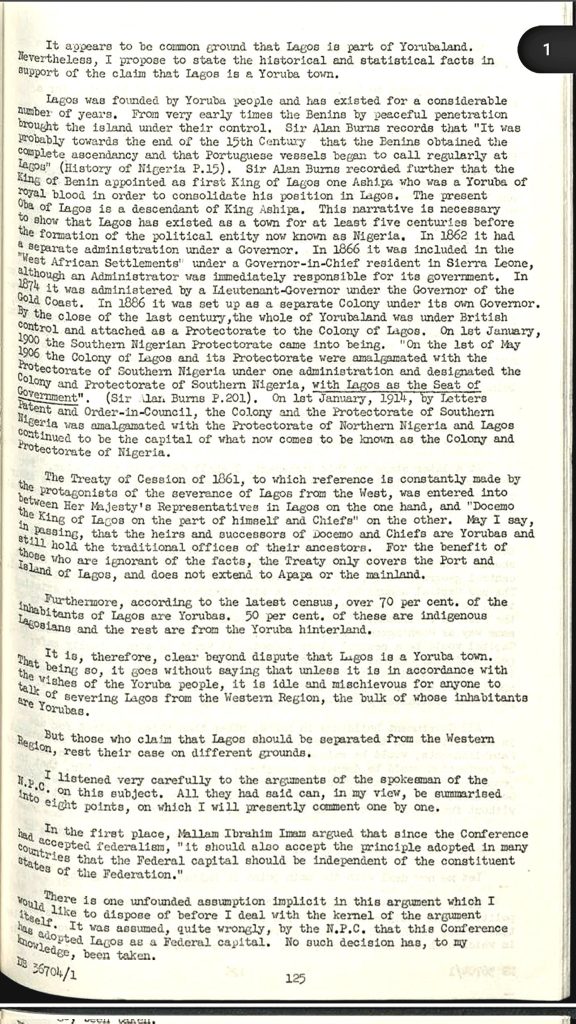
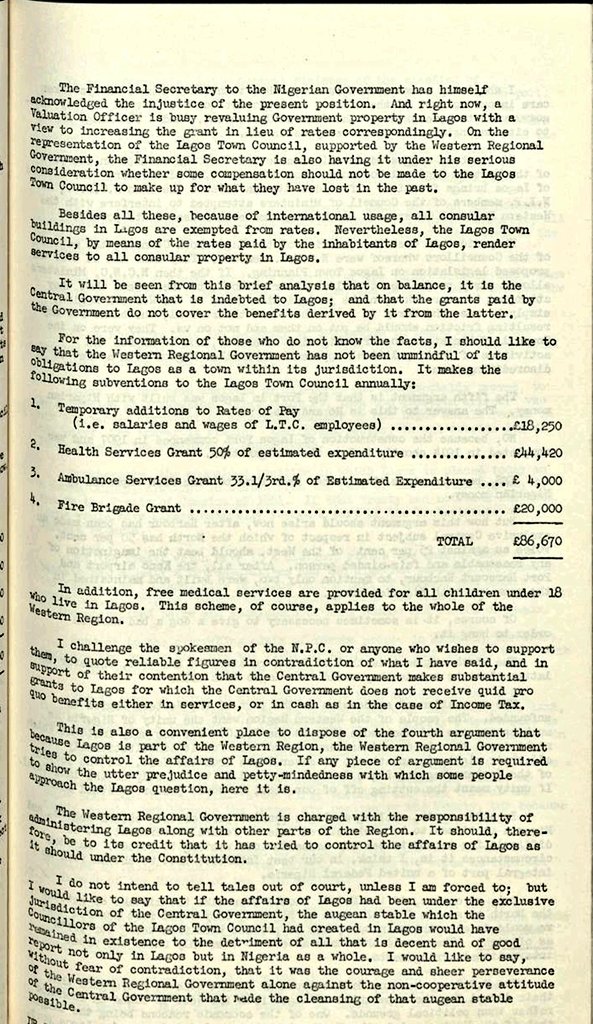
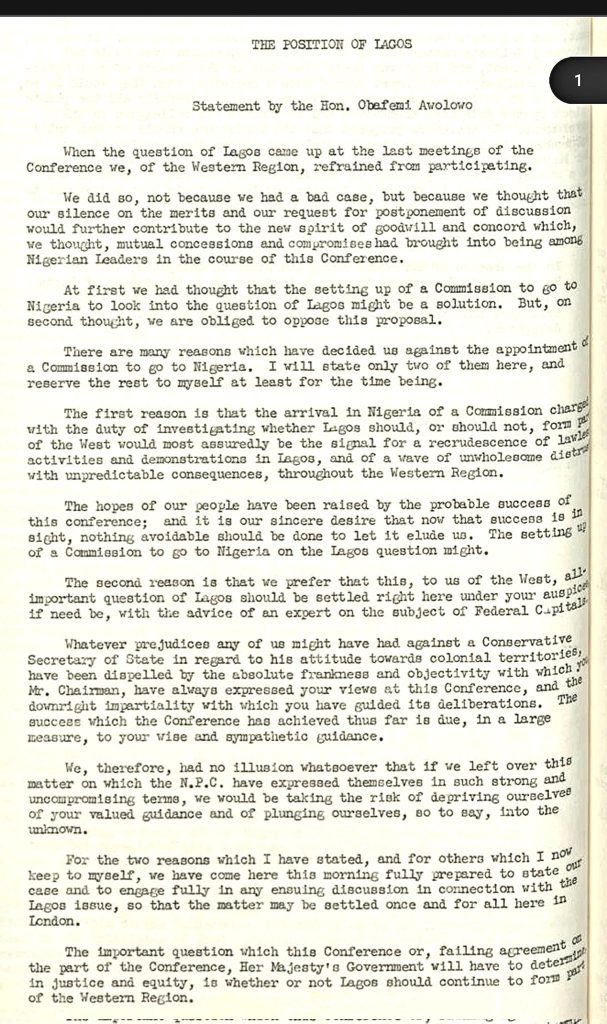
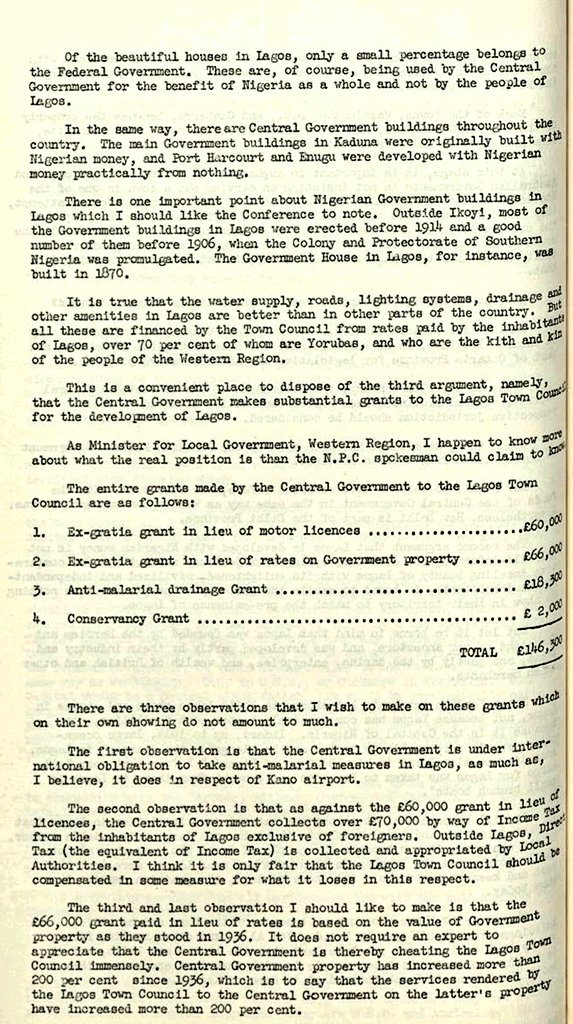
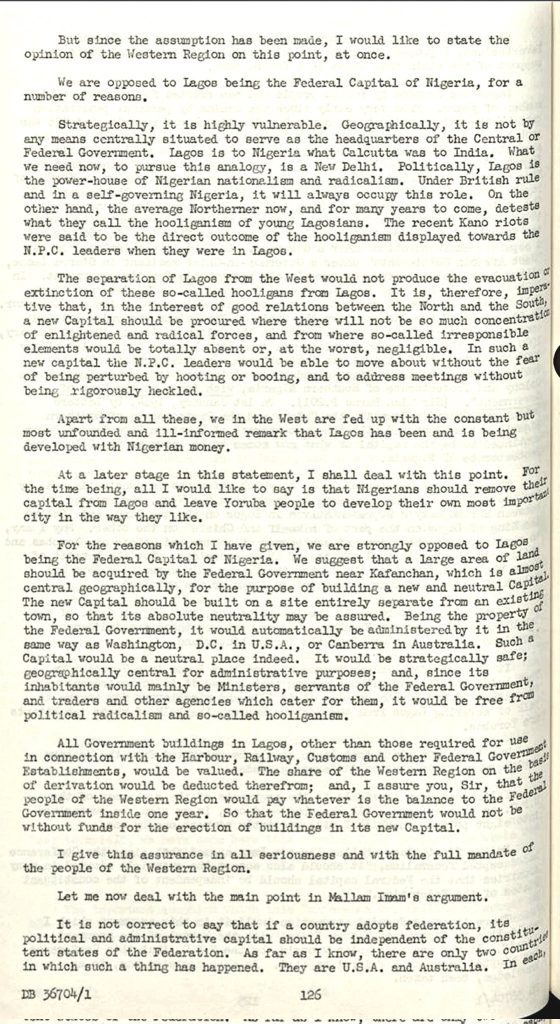
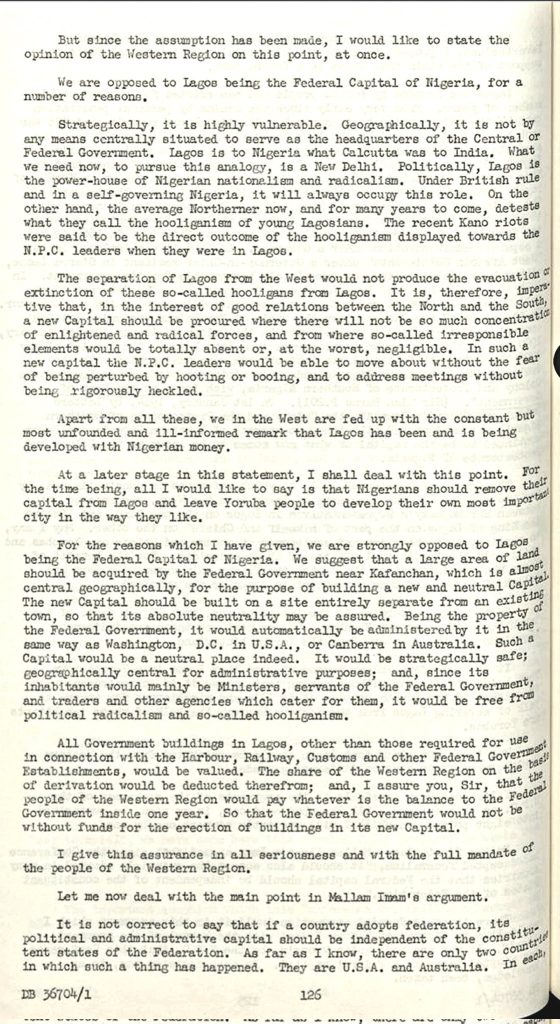
Igbos initially arrived in Lagos and any Yorùbá town between 1904 and 1911. According to the 1911 census, the Igbo population in Lagos (Èkó) (not Lagos State) was 0.5% of the total population.
How did Igbo develop Lagos after the civil war and the oil boom that followed, which increased Igbo migration to Lagos state in the 1970s?
𝐀.𝐆/𝐀𝐰𝐨𝐥𝐨𝐰𝐨 𝐑𝐞𝐬𝐢𝐬𝐭𝐚𝐧𝐜𝐞 𝐀𝐠𝐚𝐢𝐧𝐬𝐭 𝐒𝐢𝐭𝐢𝐧𝐠 𝐅𝐂𝐓 𝐢𝐧 𝐋𝐚𝐠𝐨𝐬 Azikwe and NCNC resisted after A.G. promised to contribute to funding new capital elsewhere.
Zik reported to British Oliver Lyttleton, and when Awo threatened to secede from Nigeria, Oliver threatened to use brute force. A.G./Awolowo fought against Lagos becoming the capital in 1950 and 1953.
1. At what period of history did Igbo build Lagos which had been commercial city as at 16th Century and typical Yorùbá town and wasn’t a planned capital city of Nigeria unlike Abuja?
2. Are igbos the only non Yorùbá group in Lagos? Why then are they making themselves resistant group/opposition ethnic bloc through ethno-aggregation against native community?
Isn’t migration outside one’s original homeland for economic and social benefits and interest?
3. Did they build Kano, Kaduna knowing fully well that Igbo dominated Northern civil service, railway corporation etc in the First Republic?
During First Republic, Igbo Intelligentsia in Universities reported:” In their opinion the sacrifices which the Igbo had made on behalf of Nigeria were enormous. The ethnocentric Yorùbá regarded the Igbo in Lagos as “strangers” in spite of the fact that investment opportunities were greater in Lagos, thanks to the siting in Yorùbáland of federal capital, as well as the two federal universities.
𝐓𝐘𝐏𝐈𝐂𝐀𝐋 𝐘𝐎𝐑Ù𝐁Á 𝐔𝐑𝐁𝐀𝐍𝐈𝐒𝐌, 𝐋𝐀𝐆𝐎𝐒 𝐍𝐎𝐓 𝐀𝐍 𝐄𝐗𝐄𝐌𝐏𝐓𝐈𝐎𝐍
Having Residents of Non Yorùbá Origins e.g Mende, Nupe, Ìbàrìbá, Adja, Fon, Edo in any Typical Yorùbá towns, Cities/City States or Kingdoms or Empires have been in practice for nearly 1,000 years. Hence, Yorùbá are regarded as African most urbanized People, Yorùbá evolved into building Large cities, City states, Kingdoms and Empires more than 800 years ago. It didn’t start in 21st century and Lagos isn’t the first to have such. Lagos ( Èkó) and Other parts of Lagos States have Awori Natives, some parts Ijebu natives, Some parts Remo Natives.
𝐈𝐒 È𝐊Ó ( 𝐋𝐀𝐆𝐎𝐒) 𝐀 𝐌𝐎𝐃𝐄𝐑𝐍 𝐎𝐑 𝐀𝐍𝐂𝐈𝐄𝐍𝐓 𝐂𝐈𝐓𝐘?
Lagos as a kingdom is older than 500 years and it’s one of the youngest Awori founded kingdoms in Lagos State and Ogun State. Iddo, Isheri kingdoms are up to 800-900 years old. Lagos isn’t new founded Kingdom or City State, as a matter of fact, Kingdom of Èkó/Lagos ( which is one of the youngest Awori founded kingdom) is older than Abeokuta, Ibadan, Ilorin and few others. It’s historically not accurate to call Ibadan – Ancient Yorùbá City while calling Lagos – Modern Yorùbá City but it’s developmentally true when it comes to Urbanism and development, but what’s ancient in Ibadan? Well, Anciency doesn’t mean Old buildings, Lagos is ancient and more ancient than Ibadan.
𝐋𝐀𝐆𝐎𝐒 ( È𝐤ó) – 𝐀 𝐓𝐘𝐏𝐈𝐂𝐀𝐋 𝐘𝐎𝐑Ù𝐁Á 𝐂𝐈𝐓𝐘 𝐒𝐓𝐀𝐓𝐄 𝐀𝐍𝐃 𝐔𝐑𝐁𝐀𝐍𝐈𝐒𝐌
In fact, Lagos started non Yorùbá residents since 1472 AD when the Portuguese visited for trade, then by 1550 c.a, it further received Benin, Itsekiri, Ilaje, Ijaws, Owo, Ijebu, Adja/Fon immigrants. Even Ijesa at a point, Ọba of Lagos dynasty is of Ijesa Origin when Ifakorede Alaagba, The Ifá priest of Ọba Akinsemoyin of Lagos married his daughter Erelu Kuti ( since Ọba Akinsemoyin couldn’t have male heir) and The Child born was Ologun Kutere, Ologun Kutere birthed three Sons – Eshilogun, Adele and Akintoye ( the Lagos Ọba ruling house till date) By 1700 c.a it received influx of Gun after Dahomey war, even Òyó after Badagry and Oihdah port were annexed by Òyó Empire. By 1800 c.a, Nupe through Ladunji ( victim of slave capture from today’s Niger/Kwara state) who was given Yorùbá Title of Oshodi/Oshodin – King’s Alter Ego, Egba, Ìgbómìnà, Òyó etc These have been different stages of immigration into Lagos State owned by Awori , Ijebu, Remo Natives depending on the parts.
𝐈𝐁𝐀𝐃𝐀𝐍 – 𝐋𝐀𝐆𝐎𝐒 𝐂𝐎𝐒𝐌𝐎𝐏𝐎𝐋𝐈𝐓𝐀𝐍𝐈𝐒𝐌 𝐁𝐄𝐅𝐎𝐑𝐄 𝐀𝐍𝐃 𝐀𝐅𝐓𝐄𝐑 𝟏𝟗𝟔𝟕
Ibadan during before and during Western Region was more cosmopolitan ( has more non Yorùbá immigrants) than Lagos, Lagos State was only created in 1967 and Ijebu etc provinces of Western Region were carved out and merged with it, Lagos FCT was ~0.3% of Lagos State, the rest was under Western Region. Ibadan houses Premier University of Ibadan and other facilities which attracted non Yorùbá immigrants so much that it was largest city at the time.Ibadan was already a typical Pan Yorùbá town that evolved from being a Egba village into a large encomium of Most or all Yorùbá subgroups and few non Yorùbá groups. It became the Capital of Western Region, perhaps, if Regionalism wasn’t set aside, Ibadan would be far developed than it is today.
So how could LAGOS have been founded by a group who, up until 1963, was primarily and mostly naked because there was no textile or fabrication industry?
In order to deter Eastern Nigerians from visiting marketplaces in Enugu and other Igboland cities while completely nude, Chief Michael Okpara had to impose severe fines as early as 1963.
As Chief Obafemi Awolowo had warned against, this marks the beginning of the importation of Okrika clothing, which in turn decimated Nigeria’s own textile businesses.
What could have caused these individuals’ generational, perhaps collective, delusions?
Based on available information, it’s possible that this is a result of Collective inferiority complex disguising their lack of what others have having made by them in order to comfort themselves.
Wouldn’t I be happy to make the unproven assertion that Yorùbá founded the Mighty US and beautiful Europe? Hey, see what my forefathers created?
But, being aware that “E no dey, E no dey,” I can become defensive in response to discerning or opposing opinions, even if they are based on factual information, by accusing them of prosecution and targeting some “African Jews” who experience anti-Semitism.
I can also carry placards in protest against suspected Igbophobia and unified and collective hate, and A gag up against the Superior and Exceptional Ndigbo of Nigeria, the people who built towers, towns, cities, economies, trade, and commerce, the inventors of money (ego), and those who are “second to the White Europeans” according to Nnewi-Eugenics.
It’s 1949.
At the Conference of the Ibo State Union
The Dr. Nnamdi Azikwe Manifesto:
“It would appear that the God of Africa has specifically created the Ibo nation to lead the children of African from the bondage of the ages…. The martial prowess of the Ibo nation at all stages of human history has enabled them not only to conquer others but also to adapt themselves to the role of preserver….. The Ibo nation cannot shrirk its responsibilities.
If Igbos were genuinely and demonstrably superior, the author of this piece would not be bothered; rather, the assertion is unfounded. At least, in contrast to the Nazi Germans, who employed inventiveness and technology to bolster their contentious and unproven Aryan racial idea, as is clear from their presence among other African communities, the Igbos have a limited or unknown history and lack sophisticated mythology, arts, philosophy, and much more.
It is clear that Igbo people have benefited the most from colonialism, the creation of Nigeria, and the division of people into ethnic nations. They were a stateless, or more accurately, decentralised smaller entity without a central polity, and it was clear from eyewitness testimonies and tales from tourists, guests, and even oral history of the people that they were engaging in cannibalism.
In the First Republic of Nigeria: The self-described leaders and spokespeople of the Igbo people, who were mostly university “intellectuals,” argued passionately that it would be wrong to see the Igbo as grabbers of most of the offices in the country. Given their unique abilities, they argued that they were entitled to these positions. They were the most open to new ideas and the best at assimilating them, making them superior to other ethnic groups in “culture and civilization.”
Any other Nigerian, especially one from the North, would be extremely unfair and wrong to want to rule over Nigeria. “Lacked education and and culture, and was never in a position to contribute to the advancement or progress of the country,”
To sum up:
Yorùbá and Igbo are not ‘synonymous people’; if not for enslavement and colonisation, they might not have never encountered one another.
If There’s any African Aryan Race, It’s obviously not the Igbo.
Lagos was not built on marijuana profits.
Igbophobia is a manufactured concept designed to silence dissenting opinions, discourage resistance to Igbo violence, and intimidate non-Igbo people into keeping quiet about their own experiences, particularly those whose Igbo forebears suppressed.
It’s possible that Yorubá Phobia despite being seldomly talked about exists in Nigeria and that success for Yorùbá is perceived as Yorùbá Tax (Privilege, similar to White Privilege).

